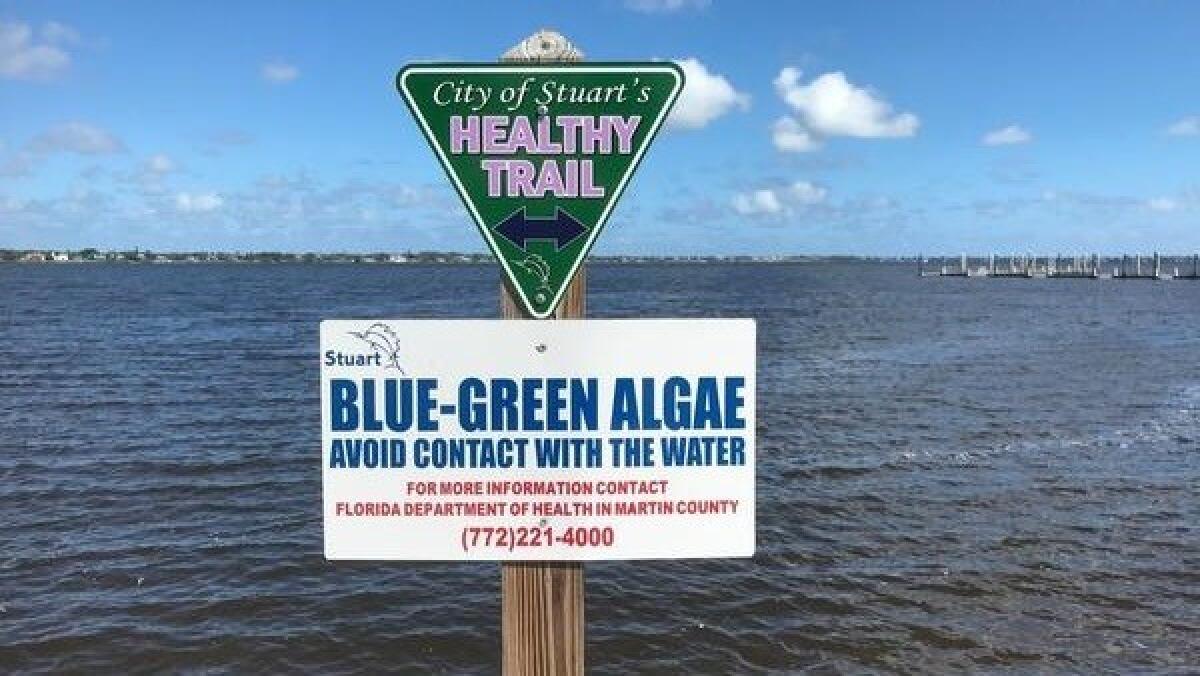As climate change becomes more visible, its weight as a campaign issue is growing

- Share via
Reporting from Jupiter, Fla. — It was only a few years ago that a strident denier of climate change who mocked the idea of humans pushing temperatures higher represented the congressional district that stretches into what Floridians fondly call their Treasure Coast.
No House candidate along the Treasure Coast talks that way now.
Worries about increasingly toxic algae blooms have consumed residents this election season. Putrid water that scientists say is aggravated by a warming climate has killed sea life, sickened residents, battered tourism – and reshaped politics up and down the state’s Atlantic coastline.
“It is getting worse,” said Betty Hardwick, 86, who was working the front desk of the Stuart Heritage Museum on a recent hot October afternoon. She has lived here since 1950.
“It’s definitely warmer, and that is causing this to stay around so long,” Hardwick said of the toxic water. “We need to do something.”
For years, conventional wisdom among political strategists has labeled climate change as a politically weak issue, a concern of environmental activists but not the mass of voters.
That’s still the case in many areas. But in districts around the country where warming is exacerbating natural disasters and disrupting regional economies, the anxiety of voters like Hardwick has started to shift how candidates campaign.
The change is clearest in Florida, a state battered by hurricanes, threatened by rising tides and, this year, wrapped in toxic algae more dangerous than even old-timers can recall. The blooms intensified and converged with an extreme bout of red tide, a toxic scourge familiar to Gulf Coast Floridians but one that almost never spreads all the way to the Atlantic shore.
“I caught snook with spots and weird growths on them,” said Jake Kielar, a 24-year-old chef at a local restaurant, as he fished off Stuart’s Healthy Trail footpath. Signs nearby warned residents to avoid contact with the water. “You could tell they were sick,” he said. “It was awful.”
The Gulf Coast is still reeling from its own horrendous and persistent red tide this season, among the worst Florida has seen in decades. It killed millions of fish, scores of dolphins and manatees, and even a whale shark.
As the red tide dragged on, Hurricane Michael tore through the state’s Panhandle region, highlighting the role climate change can play in causing more frequent and more intense storms. Only a year earlier, Superstorm Irma forced a large swath of Florida to evacuate.
The latest look at the Trump administration and the rest of Washington »
The increased focus on climate has complicated the reelection bids of numerous Republicans. They’ve found that too close an alignment with a White House and congressional leadership determined to resist action on climate can be toxic.
“We cannot afford a congressperson who supports a climate change denialist at the head of the [Environmental Protection Agency],” said Lauren Baer, the Democrat running in the state’s 18th Congressional District, which stretches north from Palm Beach along the Atlantic coast.
Her Republican opponent, first-term Rep. Brian Mast, has responded not by challenging climate science, as his party’s leadership does, but embracing it.
He notes that he’s joined the bipartisan Climate Solutions Caucus, racked up endorsements from local clean water groups and has even sided with the League of Conservation Voters, a leading environmental political group that endorsed Baer, on five out of the six climate votes they tracked this session of Congress.
Around the country, several other Republicans have at least rhetorically stepped away from their party’s opposition to action on climate change.
In California, Rep. Mimi Walters of Laguna Beach, in a tight race with a 4% lifetime voting score from the conservation league, has tried to reposition herself as a climate crusader. In August, she joined colleagues in warning that the state’s forest fires will get worse if global warming is not confronted.
Minnesota Rep. Erik Paulsen, a longtime climate change skeptic whose seat is also threatened, had a similar conversion. He joined the Congressional Climate Solutions Caucus earlier this year.
In Illinois, veteran Republican Rep. Peter Roskam did the same. He’s in a very close race in the Chicago suburbs against a Democrat who has run an ad specifically targeting Roskam’s record on global warming.
Activists deride such moves as election-season conversions, often legitimately. The climate caucus has been largely symbolic, failing to advance any major legislation.
But the fact that these conversions are happening at all signals that in some parts of the country, Republican candidates have come to see inaction on climate as a liability.
“This is not just a political issue anymore in some places,” said Anthony Leiserowitz, director of the Climate Change Communication program at Yale University. “Voters are seeing the consequences [of warming] right here, right now.”
Climate change has yet to register as a top voting priority for most Americans, Leiserowitz said, but many Democrats rank it substantially higher than they did just a few years ago. That’s driving the issue to the forefront in swing districts.
Among liberal Democrats, Leiserowitz said, climate change now ranks as their fourth-highest priority out of 28 issues he has tested. Climate has become a more urgent voting issue for liberal voters than such concerns as campaign finance reform, for example.
Republicans remain far less concerned. Only 11% of voters who plan to cast ballots for Republicans this year consider climate change a “very big” problem for the nation, according to a Pew Research Center survey released this month – a stark contrast to the 72% of Democrats who feel that way.
“This issue is more polarized than any issue in the country,” Leiserowitz said. “It is more polarized than abortion.”
But in a year when Democrats hope to make major gains, climate and clean energy have been pushed into a starring role in campaign ads in several parts of the country.
In New Mexico, a candidate is on camera climbing the giant ladder of a wind turbine, and in Iowa a Democrat is walking among a field of them. Campaign visuals of solar panels are hitting screens from New Hampshire to California this election cycle.
Orange County Democrat Harley Rouda has gotten considerable mileage out of a Twitter video he posted of his Republican opponent, Rep. Dana Rohrabacher of Costa Mesa, riffing on why he believes climate change is a fraud.
In Florida’s solidly Republican 16th Congressional District, which covers the Gulf Coast around Sarasota, voter uneasiness with environmental problems has disrupted what was supposed to be a cakewalk to reelection for Republican Rep. Vern Buchanan.
“This historically strong Republican district is closer than it should be,” Michael Binder, who directs polling at the University of North Florida, said of Buchanan’s race. Trump carried the district by 10 points in 2016, but as the red tide plagued the area, “voters are concerned. This issue is on their mind and driving votes,” Binder said.
Buchanan has responded, in part, by talking about climate change. The GOP veteran, whose record includes steadily voting against climate action, has lately been pushing a greener agenda. He very publicly – albeit unsuccessfully -- urged Trump not to withdraw from the landmark Paris climate pact. He ran an ad attacking his opponent for investing in companies that emit large amounts of greenhouse gases, even though Buchanan does the same himself.
Environmental issues have also had an effect on the state’s U.S. Senate race, one of the closest contests in the country so far.
Policies that may have worsened the red tide have become a major issue and fueled anger with Gov. Rick Scott, who is challenging incumbent Democratic Sen. Bill Nelson. Nelson, meanwhile, has taken every opportunity to highlight how failing to curb warming subjects Floridians to more of the environmental crises they are enduring right now.
If there is one politician on Florida’s coast who would seem to be immune from it all, it’s Rep. Francis Rooney, a freshman Republican from the Fort Myers area on the southern Gulf coast, whose constituents do not appear to mind the 0% voting score he has earned from the conservation league.
The political forecasting outlet Five Thirty Eight projects Rooney has a 98.5% chance of winning reelection.
Yet in early October, he made an unexpected move. He joined the climate caucus.
More stories from Evan Halper »
[email protected] | Twitter: @evanhalper
More to Read
Get the L.A. Times Politics newsletter
Deeply reported insights into legislation, politics and policy from Sacramento, Washington and beyond. In your inbox three times per week.
You may occasionally receive promotional content from the Los Angeles Times.











